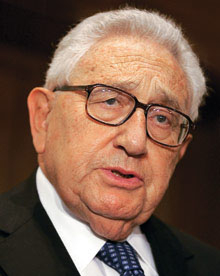An end of hubris
Nov 19th 2008
From The World in 2009 print edition
America will be less powerful, but still the essential nation in creating a new world order, argues Henry Kissinger, a former secretary of state and founder of Kissinger Associates

The most significant event of 2009 will be the transformation of the Washington consensus that market principles trumped national boundaries. The WTO, the IMF and the World Bank defended that system globally. Periodic financial crises were interpreted not as warning signals of what could befall the industrial nations but as aberrations of the developing world to be remedied by domestic stringency—a policy which the advanced countries were not, in the event, prepared to apply to themselves.
The absence of restraint encouraged a speculation whose growing sophistication matched its mounting lack of transparency. An unparalleled period of growth followed, but also the delusion that an economic system could sustain itself via debt indefinitely. In reality, a country could live in such a profligate manner only so long as the rest of the world retained confidence in its economic prescriptions. That period has now ended.
Any economic system, but especially a market economy, produces winners and losers. If the gap between them becomes too great, the losers will organise themselves politically and seek to recast the existing system—within nations and between them. This will be a major theme of 2009.
America’s unique military and political power produced a comparable psychological distortion. The sudden collapse of the Soviet Union tempted the United States to proclaim universal political goals in a world of seeming unipolarity—but objectives were defined by slogans rather than strategic feasibility.
Now that the clay feet of the economic system have been exposed, the gap between a global system for economics and the global political system based on the state must be addressed as a dominant task in 2009. The economy must be put on a sound footing, entitlement programmes reviewed and the national dependence on debt overcome. Hopefully, in the process, past lessons of excessive state control will not be forgotten.
The debate will be over priorities, transcending the longstanding debate between idealism and realism. Economic constraints will oblige America to define its global objectives in terms of a mature concept of the national interest. Of course, a country that has always prided itself on its exceptionalism will not abandon the moral convictions by which it defined its greatness. But America needs to learn to discipline itself into a strategy of gradualism that seeks greatness in the accumulation of the attainable. By the same token, our allies must be prepared to face the necessary rather than confining foreign policy to so-called soft power.
Every major country will be driven by the constraints of the fiscal crisis to re-examine its relationship to America. All—and especially those holding American debt—will be assessing the decisions that brought them to this point. As America narrows its horizons, what is a plausible security system and aimed at what threats? What is the future of capitalism? How, in such circumstances, does the world deal with global challenges, such as nuclear proliferation or climate change?
America will remain the most powerful country, but will not retain the position of self-proclaimed tutor. As it learns the limits of hegemony, it should define implementing consultation beyond largely American conceptions. The G8 will need a new role to embrace China, India, Brazil and perhaps South Africa.
The immediate challenge
In Iraq, if the surge strategy holds, there must be a diplomatic conference in 2009 to establish principles of non-intervention and define the country’s international responsibilities.
The dilatory diplomacy towards Iran must be brought to a focus. The time available to forestall an Iranian nuclear programme is shrinking and American involvement is essential in defining what we and our allies are prepared to seek and concede and, above all, the penalty to invoke if negotiations reach a stalemate. Failing that, we will have opted to live in a world of an accelerating nuclear arms race and altered parameters of security.
In 2009 the realities of Afghanistan will impose themselves. No outside power has ever prevailed by establishing central rule, as Britain learnt in the 19th century and the Soviet Union in the 20th. The collection of nearly autonomous provinces which define Afghanistan coalesce in opposition to outside attempts to impose central rule. Decentralisation of the current effort is essential.
All this requires a new dialogue between America and the rest of the world. Other countries, while asserting their growing roles, are likely to conclude that a less powerful America still remains indispensable. America will have to learn that world order depends on a structure that participants support because they helped bring it about. If progress is made on these enterprises, 2009 will mark the beginning of a new world order.
Source: www.economist.com, Nov 19th 2008





